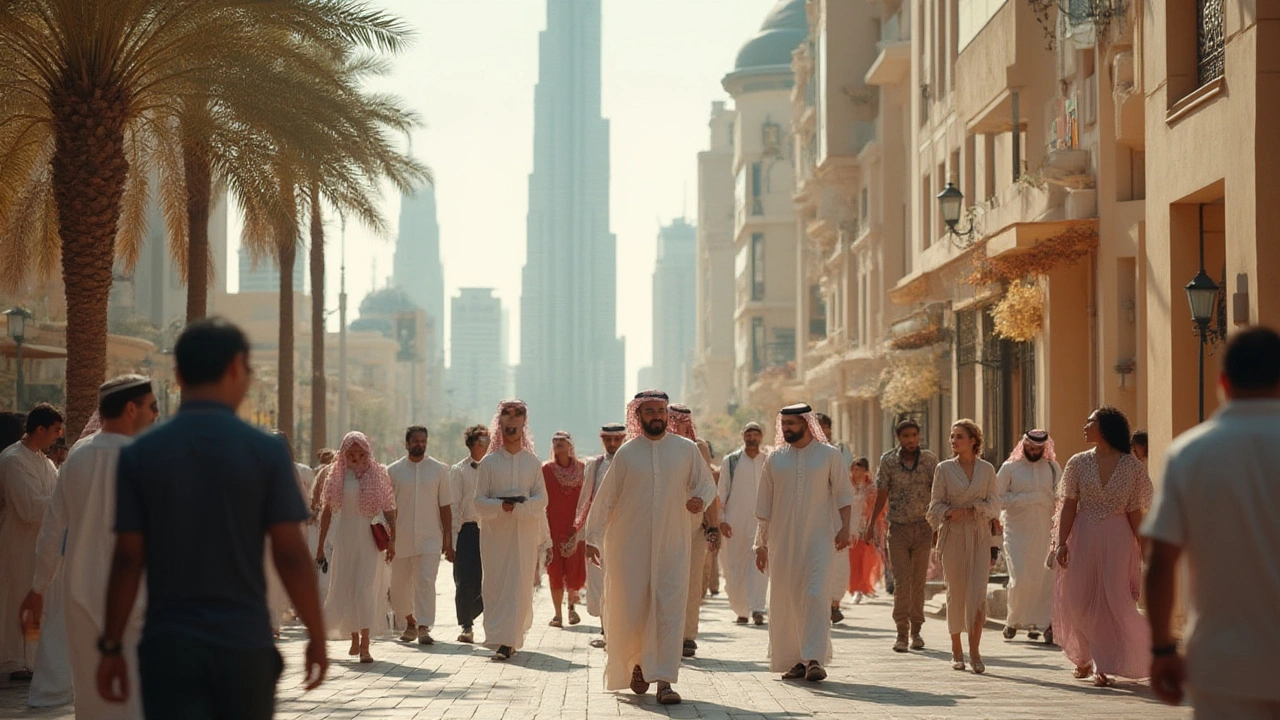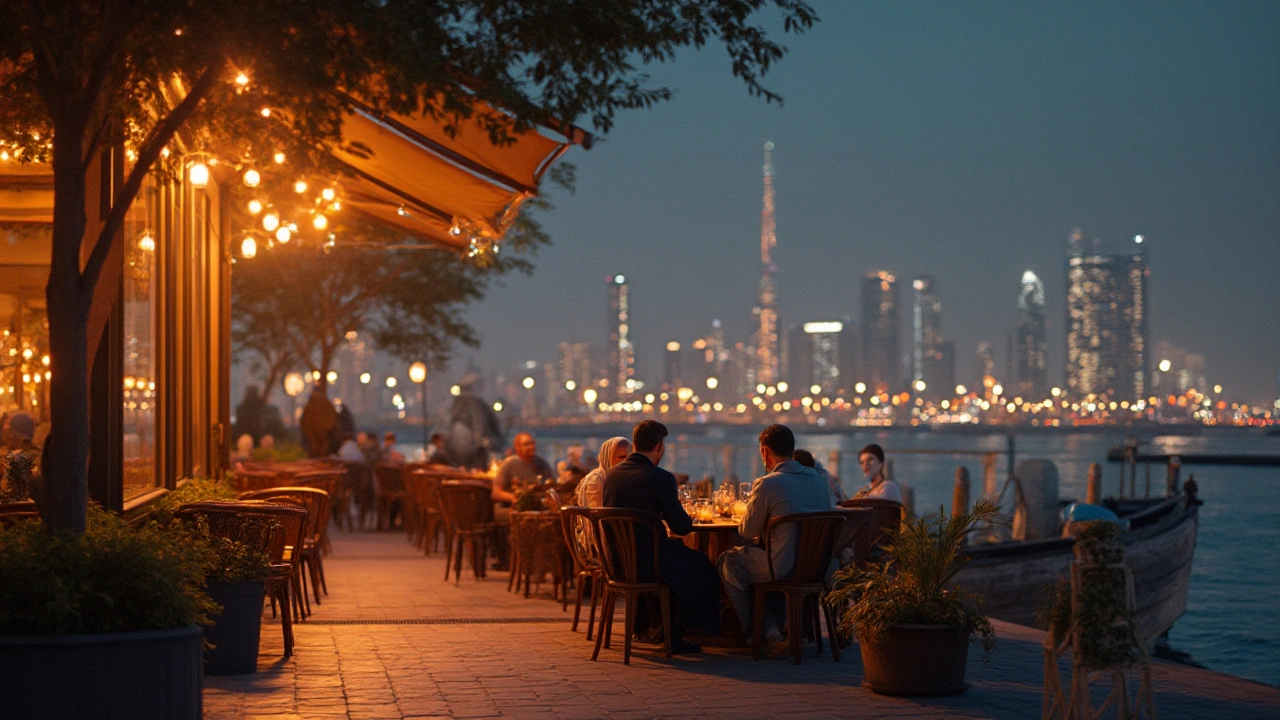
Dubai looks like this shimmering land of opportunity, where luxury is on display and skyscrapers gleam in the sun. It's where folks go to chase a dream, set up business, or just bask by the beach. But behind the sparkling exterior sits a city grounded in firm tradition and law. One clumsy mistake or an innocent slip and you might find yourself in hot water—or at least being stared at on the Metro. Trust me, some stories that tourists bring home are less about shopping and more about, "Did you know you can't…?"
Unspoken Rules: Behaviors and Gestures That Don’t Fly
Let's start with the obvious—public displays of affection. You might be used to holding hands or sneaking a kiss on the street in Paris or even rainy Edinburgh, but in Dubai that stunt will get you frowns, maybe even a fine or a chat with the police. The city is more chill about married couples holding hands, but kissing or hugging in public? Nope. People have actually ended up spending a night in jail for much less.
Swearing and rude gestures can really backfire (pun intended). Even something as simple as flipping the bird in traffic can land you in a lot more trouble than you'd expect—think legal trouble, not just angry stares. People have been fined or deported for what they thought was just blowing off steam.
Dress code isn’t just a gentle suggestion. While Dubai is less strict than some neighboring regions, showing off too much skin in public spaces, especially malls, government offices, or during Ramadan, is a no-go. Women should aim for clothing that covers shoulders and knees, and men aren’t exempt either—a shirtless chest or saggy shorts downtown screams disrespect.
Photography is another sticky zone. It seems harmless, but pointing your camera at locals, especially women, strangers, or government buildings is not only rude, it’s illegal. There've been multiple incidents where tourists have ended up in legal limbo after snapping away at the wrong time or place.
During Ramadan, eating, drinking, or even chewing gum in public during daylight hours is out of bounds. That includes foreigners and expats. It’s not just “bad form”—you can actually get a warning or even a fine.
Tipping is optional in Dubai but not tipping at all in a sit-down restaurant, or dismissing service staff rudely, can earn you some serious stink-eye. Most people working in hospitality are from outside the UAE and rely on tips, so tossing a few dirhams their way goes a long way.
- Never point your feet at people (seen as unclean, so avoid it in gatherings).
- Keep your shoes on in public but take them off when entering a traditional home or mosque.
- Don't cross your legs so your shoe sole faces someone; that's rude.
All things considered, Dubai’s etiquette is rooted in respect and modesty. Show a little humility, and locals appreciate it. These things might seem tiny but can make or break your experience—and save you a lot of unnecessary stress.

Guardrails: Legal Boundaries and Civic Pitfalls
This is where things can get serious. Dubai takes its laws seriously—and that’s not just about theft or violent crime. Some of the stuff that seems completely casual elsewhere can spiral into big deals really fast here.
The city operates under a mix of Sharia and civil law, and ignorance isn’t seen as an excuse. For example, alcohol is only allowed in licensed venues, and you must be at least 21 to order a drink. Taking alcohol bought from duty free to plazas, the street, or the beach? High risk. If you’re caught even tipsy in the wrong place, you could be detained. And getting into a fight, especially after drinks, is almost always a double whammy—public disturbance and drinking offense.
Drugs are a massive red line. The UAE has a zero-tolerance policy, and being caught with even trace amounts on you (or in your bloodstream) can mean jail time, deportation, or worse. There was a well-publicized case in 2022 of a tourist who got several years behind bars for what he thought was medicine—so always check before traveling.
Same for prescription meds. If you need to travel with anything for anxiety or pain relief, make sure it’s approved for use in Dubai. Keep the doctor’s note and bring only as much as you need. Customs have been known to detain people for carrying what’s legal elsewhere.
Being LGBTQ+ is another area with big boundaries. Homosexuality is illegal in Dubai and can subject people to arrest, prosecution, and even deportation. Openly talking about, depicting, or advocating LGBTQ+ rights in public is extremely risky.
Moving on—defamation and slander aren’t only lawsuits here, they’re criminal offenses. This applies on social media, WhatsApp, and even comments in private groups. Posting angry reviews online, especially if they touch on religion or personal appearance, can end up in court. And taking a picture of someone, then sharing it online without consent, can get you fined or jailed.
Let’s talk about something weirdly specific: bouncing checks. In lots of places, a bounced check is just a financial blip. In Dubai, it's a criminal offense, and people have ended up in jail for it.
Spitting, public urination, or even dropping cigarette butts on the pavement—these are all treated as public offenses. Fines are hefty, and repeat offenders end up in deeper trouble.
| Offense | Potential Penalty |
|---|---|
| Public Kissing | Fine, jail, deportation |
| Drunk in Public | Jail, fine, deportation |
| Swearing/Rude Gestures | Fine, jail, deportation |
| Eating in public during Ramadan | Warning, fine |
| Taking photos of government buildings/locals | Fine, jail, deportation |
| Bouncing a check | Jail, fine |
| Drug possession | Long jail sentence, deportation |
Here’s a good tip: when in doubt, ask a local, or err on the side of caution. Dubai can be an incredible place to live or visit, but only if you’re playing by the city’s rules.

Culture Clash: Everyday Social Mistakes Visitors Make
It’s the little things that trip new folks up. For instance, using your left hand to offer or receive something is seen as rude, since the left hand is considered “unclean” in Gulf culture. Try paying at a shop with your left hand, and you’ll see the cashier pause just a beat. When in doubt, use your right.
Religion is a big deal in Dubai. It’s tempting to wander into a mosque, but always make sure it’s open to non-Muslims. When Friday prayers roll around, don’t hover near the entrance with your phone—respect the worshippers’ privacy. During the call to prayer, lowering your volume and being respectful wins you points… or at least avoids glares.
Gift giving has rules—never give alcohol unless you are 100% sure the recipient drinks (and most locals don’t). Don’t give perfumes with alcohol content or pork products. Opt for chocolates, dates, or carefully chosen handicrafts.
Handshakes require a pause. Never extend your hand to an Emirati woman unless she offers hers first. If she places her hand over her heart and smiles, that’s her polite way of declining. Men usually get a handshake, but don’t go in for the back-slap or bear-hug.
Phones at the dinner table? Massive faux pas. Business meetings, too. If you’re invited to someone’s home or workplace, offer a word of thanks before diving into any conversation about money. Small talk matters. You don’t have to love football, but acting curious about Dubai or the family goes a long way.
This city is global for a reason: 80% of Dubai’s population comes from abroad. But that doesn’t mean you should treat it as a “free for all.” The mix of cultures makes for great food, yes, but also means everyone is pretty quick to spot disrespect. Assume your behavior is being noticed—and judged.
Here’s a list of “social survival” moves that make life easier:
- Use formal greetings until invited to relax—"Salam Alaikum" works everywhere.
- Never discuss politics, religion, or personal finances loudly in public.
- Thank a host several times, but don’t gush—modesty is appreciated.
- Never show the soles of your feet to elders or in group settings.
- Don’t bring up Qatar or Israel unless you want a very tense silence.
Dubai is always evolving, but its heart stays close to tradition. It’s all about respect—a willingness to observe first, act second. Want to blend in? Watch how the locals do things, don’t rush, and when in doubt, ask. Missed a rule? Apologize quickly. They’ll sense your intention and that often speaks louder than words (or an uncovered knee).
Navigating Dubai means checking your habits at the airport—not your personality, just your assumptions about what’s "normal." Get those right, and you’ll leave Dubai with stories you want to remember.
Dubai Escort